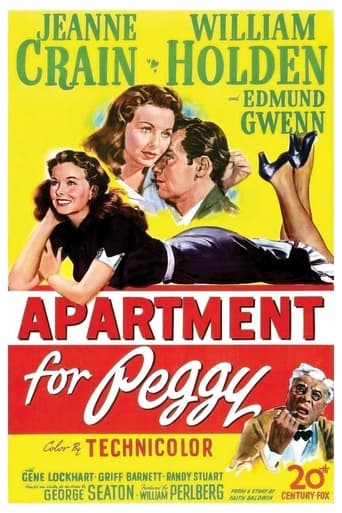WilliamCKH
On the surface, this film looks like a typical 1940's Technicolor feel good movie On paper, the story deals with a young GI couple looking for an apartment at a University. They find a retired professor, played by Edmund Gwenn, with an attic to rent. With this storyline known, I was expecting to be entertained, a little.What a surprise though when the movie got rolling... there were so many scenes in this movie that absolutely astonished me. The very first was Gwenn's, rationality for wanting to commit suicide at the beginning of the picture. There was in the script a logic and non-sentimentality for this rational that I was very surprised to see from a film of that era. Then comes Jeanne Crain, who plays the wife. I had always thought Jeanne Crain was a pretty, competent actress and had not seen her but once or twice on the screen. But she is absolutely tremendous as Peggy. She dominates every scene she's in because her presence is just that of aliveness and wonder. Then the movie becomes more surprising when it begins to talk about issues of poverty, making a living, racial issues, money, marriage, education, and so much more. "Never hold money so close in front of you that you can't see anything else". There is a long scene with Gwenn and a group of women talking about Philosophy that is also very refreshing.Then comes the other surprising parts. Peggy loses her baby...the movie shows the doctor walking into the room saying "The baby's dead" and with a long, long silence, Holden says "Why" and that's it, no more sentimentality about the baby...it's over.The one scene I was completely taken aback bye was the scene where Gwenn and Holden are trying to put together a baby tub, a gift for Peggy. The scene last almost 5 minutes of these to guys trying to figure out the instructions on putting this thing together. I reminded me of an Eric Rohmer picture, where people are shown as they're doing things without the need to hurry things along for the sake of the plot and gave the viewer a great connection with the characters.Although it is not on VHS or DVD, try to seek this film on TV or any old moviehouses showing it, you will be delightfully surprised how modern and life affirming this film is. A deeply rewarding experience indeed.
Neil Doyle
JEANNE CRAIN was at the height of her appeal as a demure charmer at Fox, just beginning to be more than a pretty face as far as her acting career was concerned. And here she had two splendid co-stars: WILLIAM HOLDEN as her ex-G.I. hubby and EDMUND GWENN as a little retired professor who has some housing space in his attic. When Crain finds out about the available space (during the big housing shortage at the time), she convinces Gwenn to rent the apartment to the young married couple.From there, the plot takes a few steps beyond that bare outline, always throwing a positive outlook at women who want to better themselves with an education as well as the G.I.s entitled to do so under the G.I. bill.Gene Lockhart, Griff Barnett and Betty Lynn fill the supporting roles amiably and it's probably Jeanne Crain's best film of that period, following her enormous success as MARGIE two years previously.
NancyKM
I watched this twice on cable. I really liked the contrasts. I loved the way the young students respected the professors and elders in general, and co-existed with them -- not just barely tolerated them. Also, just simple common sense was so pleasant to see. No "major plot twists" with contrived "stupidity". By stupidity, I mean the typical, "such as turning your back on a bad guy", or when teens are in a house that has a known killer in it, and the kids decide to split-up to find him, and then get picked off one at a time. Needless to say, there is no "bad guy" or "killer" in this movie, but there are a couple of things that happen, and common sense not only wins out, but was also present from the beginning. Also, the hardship of a housing shortage just after World War II versus the desire for a college education. Despite that obstacle and other obstacles, these "young" adults were adult about overcoming their problems, most of the time. Also, I liked that Peggy established a lecture (series?) for the wives of students when she discovered that many wives felt left out of their husbands lives due to lack of formal education. The women weren't dumb, just hadn't been exposed to the same ideas. And a note to teens of today, yes, there was a time that many students were husbands/men and wives were in a secondary position. I found the movie very uplifting, amusing and well acted.
moonspinner55
Jeanne Crain is a breathlessly talkative expectant mother who lives with her husband, a former soldier, in a trailer; she chances to meet retired professor Edmund Gwenn, who feels his mundane, monotone existence means retreating from this world, but he goes along with her plan to let the couple temporarily move into his attic. The perfect example of what they used to call 'whimsical comedy'; despite a clumsy start, it still seems heartfelt today, perhaps even meaningful. Gwenn conveys the most complex emotions simply by wordless expression, and Crain's exuberance grows on you (she's better though in her quieter moments). With these two front and center, William Holden ends up playing third wheel, but his solid, masculinely amiable presence is a nice counterpoint to kooky Crain and he also has some fine scenes alone with Gwenn. The gentlemen in Gwenn's musical troupe are all wonderful, and the writing and direction, while primed for audience approval, genuinely work wonders with what might've been a stale set-up. This tear-jerker is a true gem. ***1/2 from ****


